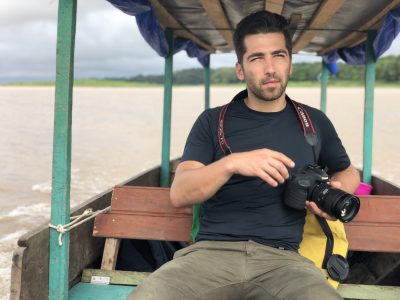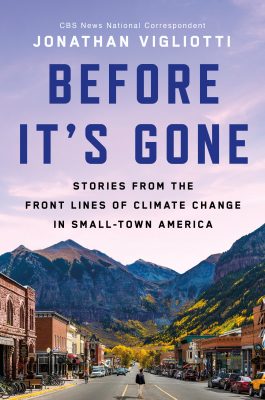Reporting From the Front Lines of Nation’s Struggle With Climate Change
News Based on facts, either observed and verified directly by the reporter, or reported and verified from knowledgeable sources.

Jonathan Vigliotti recalls vividly growing up playing in the woods near his Mount Kisco home. He also remembers when residents in his neighborhood, including his parents, fought a proposed housing development that would have leveled many of those trees.
A young Vigliotti realized for the first time that ecosystems and the environment are fragile.
But it was also a time where he saw how the power of words, written and spoken, could have a real impact and influence on policymakers, as the project was scrapped and those woods, some 30 years later, remain standing.
“I think since then I’ve had an appreciation for not just journalism and the power of the journalism to open up people’s minds but also to, in this case, protect our environment,” Vigliotti said.
Those boyhood lessons have led Vigliotti, for the past nine years a CBS News national correspondent, to write his debut book, “Before it’s Gone: Stories from the Front Lines of Climate Change in Small-Town America.” Released on Apr. 2, the accounts he provides crisscrossing the U.S covering weather-related events and potential solutions are based on many of his experiences and seeing firsthand the devastating effects of climate change on communities and its survivors.
And don’t get Vigliotti started on whether man-made climate change is real and whether this and future generations have the ability to stem the tide against increasingly ferocious and destructive storms. He can rattle off data that could convince even some of the most ardent climate-change deniers that there has been extreme change just in the last 40 to 45 years that go beyond typical variables.
In 1980, the federal government responded to just 30 weather-related disasters nationwide; in 2020, that number reached more than 260.
In the last 60 years, more CO2 has been pumped into the atmosphere than in the prior 6,000 years combined, and in the United States, the most destructive storms in the nation’s history have almost exclusively happened in the past 20 years, Vigliotti said.
 The storms aren’t only more destructive, they are reshaping the U.S., and every year communities here and abroad are being erased from the map.
The storms aren’t only more destructive, they are reshaping the U.S., and every year communities here and abroad are being erased from the map.
“More and more, Mother Nature is outpacing our ability, our modern tools, to hold her back in ways that never happened before,” said Vigliotti, a 2001 Fox Lane High School graduate.
In hopes of opening the eyes of more people on one of the more polarizing issues facing the U.S., Vigliotti focused large portions of his book on those who have been most devastated by the climate crisis as opposed to people who have been lucky enough to avoid having been directly affected by the changes.
Also, humans have the innate ability to sense a threat before it occurs, but people have chosen to ignore their own warning system, he said.
“Climate change has been an abstract threat and solutions are daunting, and for some reason, as a result, people have turned that part of their imagination off,” Vigliotti said. “I focus on the stories of survivors so much in my book because I think that’s the first step to communicating with others who may not understand the threats, who may not understand the links, and it could be, if done well, and I hope I do so effectively, a way of turning that part of the brain on that helps us to imagine, so we can imagine what could happen to our communities if we’re not prepared and imagine ways of making them more resilient ahead of the next storm.”
Despite the challenges and the polarization, Vigliotti remains hopeful that ordinary citizens and individual communities can start to enact the changes necessary to make for a brighter future.
In 2018, the Town of Paradise, Calif. was 95 percent destroyed by a wildfire. Officials enacted sweeping new legislation that would make the community more adaptable by managing vegetation close to homes, building structures with fire-resistant materials and burying power lines to prevent fires from reaching the center of town, Vigliotti said.
Other communities can also prepare with improved results based on their needs and threats.
“So I see that as a sign of hope,” Vigliotti said. “Land is finite; our population is growing, we have to within reason to work with the land that we do have, and I think if we keep habitat change front and center, we can, therefore, find solutions to make area that may be threatened, that may be high risk perhaps safer for people to live.”
‘Before it’s Gone’ was published by One Signal Publisher/Atria Publishing Group, a division of Simon & Schuster.

Martin has more than 30 years experience covering local news in Westchester and Putnam counties, including a frequent focus on zoning and planning issues. He has been editor-in-chief of The Examiner since its inception in 2007. Read more from Martin’s editor-author bio here. Read Martin’s archived work here: https://www.theexaminernews.com/author/martin-wilbur2007/
